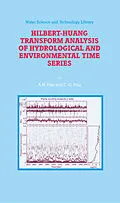The Hilbert-Huang Transform ((HHT) is a recently developed technique which is used to analyze nonstationary data. Hydrologic and environmental series are, in the main, analyzed by using techniques which were developed for stationary data. This has led to problems of interpretation of the results. Environmental and hydrologic series are quite often nonstationary. The basic objective of the material discussed in this book is to analyze these data by using methods based on the Hilbert-Huang transform. These results are compared to the results from the traditional methods such as those based on Fourier transform and other classical statistical tests.
Audience This book will be of value to researchers interested in climate change and advanced graduate students in civil engineering, atmospheric sciences and statistics.
Autorentext
I. GENERAL INFORMATION
Name: A. Ramachandra Rao
Date of Birth: 23 October 1939
Academic Record
School Attended Degree Date
University of Illinois 1964-68 Ph.D. 1968
University of Minnesota 1962-64 M.S.C.E. 1964
University of Mysore (India) 1956-60 B.E. 1960
1. Professional Experience:
Employer Position Date
University of Mysore Lecturer in Civil 1960-62
(India) Engineering
University of Minnesota Research Assistant 1962-64
University of Illinois Research Assistant 1964-68
Purdue University Visiting Assistant 1968-70
Professor
Purdue University Assistant Professor 1970-73
Govt. of New Zealand NRAC Senior Research Fellow 1977-78
Purdue University Associate Professor 1973-80
Purdue University Professor 1980-
Construction Engineering Visiting Faculty May-July, 1983
Research Laboratory Member 1983
Purdue University Acting Head, Hydraulics 1983-84
and Systems Engineering Area
Indian Institute of Science, Visiting Professor of Jan-July,
Bangalore, India Civil Engineering 1989
University of Illinois, Visiting Professor of Jan-May
Urbana, IL Civil Engineering 1998
2. Awards, Honors, Citations
Awarded a Senior Research Fellowship by the National Research Advisory Council, Government of New Zealand, for research in hydrology with the Ministry of Works and Development during 1977-78.
Awarded (but not accepted) a "Senior Scientist Fellowship" by the Alexander Von Humboldt Foundation, West Germany (1977).
Awarded (but not accepted) the "C.H. Munro Fellowship" of the Water Research Foundation of Australia, for research in Hydrology, at Monash University, Clayton, Victoria, Australia (1977).
Honorary Societies
Member, Chi Epsilon, Sigma Xi
Citations
American Men and Women of Science
Who's Who inthe Midwest
Who's Who in Frontier Science and Technology
Who's Who in Science and Engineering
Who's Who, Environmental Registry
Who's Who in the World
Who's Who in American Education
Invited Activities and Lectures
Invited by UNESCO to attend the "International Symposium on Hydrologic Aspects of Droughts", New Delhi, 3-8 December 1979.
Member, American Delegation to the XVIII General Assembly, IUGG, Hamburg, Federal Republic of Germany, August 15-27, 1983.
Invited Specialist, IAWPRC Seminar on "Rainfall as the Basis for Urban Runoff Design and Analysis", Technical University of Denmark, Lyngby, Denmark, August 24-26, 1983.
Invited lecture, "Detection of Climatic Changes in Hydrologic Time Series". Eighth IHD Endowment Lecture, Anna University, Madras, India, April 13, 1989.
Keynote lecture, "Bayesian Unit Hydrographs" International Conference on Hydrology and Water Resources, Delhi, India, December, 1993.
Member, Editorial Board of "Water Science and Technology Library", Kluwer Academic Publishers B.V. Dordrecht, The Netherlands, (1993-99).
Editor, "Journal of Irrigation and Drainage Engineering", ASCE, 1992 - 1998.
Keynote lecture, "Bayesian Unit Hydrographs" International Conference on Hydrology and Water Resources, Delhi, India, December, 1993.
Founder/honorary member, "Center of Resource Management and Eco-development Studies", I.I.T., Delhi, 1994.
Fellow, Indian Association of Hydrologists.
"Edmund M. Burke Outstanding Civil Engineering Professor", School of Civil Engineering, Purdue University, April 1995.
Invited paper, "Principal Component Analysis of Hydrologic Data", A.R. Rao and T.T. Burke, Jr., NATO Advanced Research Workshop on "Integrated Approach to Environmental Data Systems", Izmir, Turkey, Sept. 16-20, 1996.
Invited to deliver a keynote paper in the International Symposium on "Emerging Trends inHydrology", Department of Hydrology, University of Roorkee, India, Sept. 25-27, 1997.
tßp, Dean Marion B. Scott 1997 Exemplary Character Award, Purdue University.
Invited speaker, Int. Conference on Water, Environment, Ecology, Socio-Economics and Health Engineering, Seoul National University, Seoul, Korea, Oct. 18-21, 1999.
Invited...
Zusammenfassung
To accommodate the inherent non-linearity and non-stationarity of many natural time series, empirical mode decomposition (EMD) and Hilbert-Huang transform (HHT) provide an adaptive and efficient method. The HHT is based on the local characteristic time scale of the data. The HHT method provides not only a precise definition in time-frequency representation than the other conventional signal processing methods, but also more physically meaningful interpretation of the underlying dynamic processes. The EMD also works as a filter to extract the variability of signals with different scales and is applicable to non-linear and n- stationary processes. This promising algorithm has been applied in many fields since it was developed, but it has not been applied to hydrological and climatic time series. The discussion in this book starts with several simulated data sets in order to investigate the capability of this method and to compare it to other conventional frequency-domain analysis methods that assume stationarity. Rainfall, streamflow, temperature, wind speed time series and lake temperature data are investigated in this study. The aim of the work is to investigate periodicity, long term oscillations and trends embedded in these data by using HHT. The analysis is performed in both the time and frequency domains. The results from HHT are compared to those from the multi-taper method (MTM) which is based on Fourier Transform of the data.
Inhalt
Hilbert-Huang Transform (HHT) Spectral Analysis.- Hilbert-Huang Spectra Of Simulated Data.- Rainfall Data Analysis.- Streamflow Data Analysis.- Temperature Data Analysis.- Wind Data Analysis.- Lake Temperature Data Analysis.- Conclusions.
